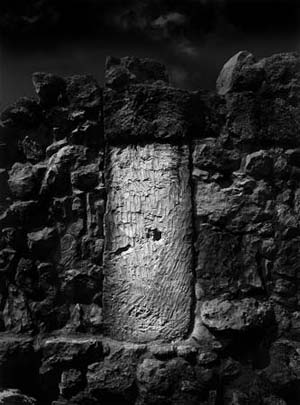
|
THE FIRST DOMINO
 If we know anything -
If we know anything -
it is to know that we know something. Knowing is the clearest indication that we exist. As Descartes put it, "Cogito ergo sum - I think, therefore I am." But from where does that "something" originate? Where is the beginning of knowledge? Where does cognition start? We understand almost all things by relating them to what we already know. Every new piece of knowledge is like a domino we attach to a preexisting chain of cognitive "dominoes." We can only understand something if we can find it a home, if we can connect it to what we already understand. For example, the fact that the circumference of a circle is 2πr is no more than an inscrutable puzzle to someone who has no idea what a "circumference" or a "circle" is. Similarly, knowing that Brazil won the World Cup in 1970 is not a piece of information that can be grasped by someone who has no idea what a "Brazil" might be, or a "world," or a "cup," let alone the hieroglyphic "1970." Cognition works by association. We know things because we can attach them to other things that we know. But how does the process start? Where does that first knowledge come from? If knowledge can only work by attaching itself to that which is already there, necessarily there must be some point, however minuscule, of prior cognition to which that knowledge attaches. But where does that first point come from? It's axiomatic then that we cannot grasp that first point by ourselves - because that first point of cognition would have nothing to attach itself to. It's like starting a car. Once the car is running, the machine itself can generate enough power to sustain the cycle as long as the fuel lasts. To start the car, however, you need an outside force - an electric starter or, if all else fails, a crank handle. Where is the crank handle, the starter engine, of cognition? Who gave us the first domino? All beginning starts from beyond. Our understanding commences only from after that beginning point and onwards. But that first point, the beginning of knowledge itself, is beyond - beyond our understanding, beyond our grasp. That first point is the basis of all understanding; without it we have nothing on which to build knowledge, but it itself cannot be understood. It is hidden. It is something that God gives. The Torah starts with the letter bet: "Bereishit..." (Similarly, the convention is to print the tractates of the Talmud starting from page 2 - bet.) Bet is the second letter of the alef-bet. Why doesn't the Torah start with the alef? In this world, the alef is always beyond. "In the beginning of God's creating the heavens and the earth..." The Targum Yerushalmi, an Aramaic translation of the Torah, translates the expression "in the beginning" as "with wisdom." Beginning is synonymous with wisdom. That original point of wisdom, that beginning of knowledge that only God can give us, is always beyond. It is the basis of all understanding, but it itself cannot be understood. Every year, on the festival of Shavuot, we celebrate God communicating with mankind at Mount Sinai. The Torah describes the moment thus: "God spoke all these words, saying: 'I am God, your God, who has taken you out of the land of Egypt, from the house of slavery...' " Rashi explains that the phrase "God spoke all these words, saying..." means that God spoke all Ten Commandments in one utterance - an impossibility for man, since such an utterance neither can the mouth speak nor the ear hear. What was the point of this unified utterance that was impossible to grasp? What was given over to us in that utterance that fused everything together, an expression of speech that could neither be spoken nor understood? When God created the world, He created it with Ten Statements. The first of these Statements was "In the beginning..." The second was "And God said, 'Let there be light.' " The third, "And God said, 'Let there be a firmament in the midst of the waters.' " Each one of the Ten Commandments at Sinai is a direct parallel, one for one, to the Ten Statements with which the world was created. "In the beginning" parallels "I am God, your God, who has taken you out of the land of Egypt." "Let there be light" parallels "You should not recognize the gods of others," etc. Just as God created the world "in the beginning," so He "recreated" the world at Sinai. God gave man existence with the statement "Let us make man." At Sinai, however, that existence came to an end. When God said, "I am Hashem, your God," the life force of the entire Jewish people left their bodies. When God returned their souls, they were powered by a different utterance: "I am Hashem, your God..." From the moment of its giving, the Torah became the animating dynamic of the new world. A new world, however, requires a new beginning. Now we can understand the significance of that utterance that no human mouth can speak nor ear hear. With that utterance, God created a new beginning, a new beginning to life, a new beginning to cognition - a point of departure for all that was to follow, but it itself was beyond understanding. You can't speak it. You can't hear it. But without it, nothing else is understood correctly. It is the first domino of a new world. FEELING THE KNOWING
there!
all the war-torn clich�s are born again unspeaking all the unstill words still tingling from the spine electric. there! a New Moon over Jerusalem! there! feeling the knowing that this beautiful silver sliver is the shining under the door of a great palace of Light. There! More articles available at Ohr Somayach's website. |